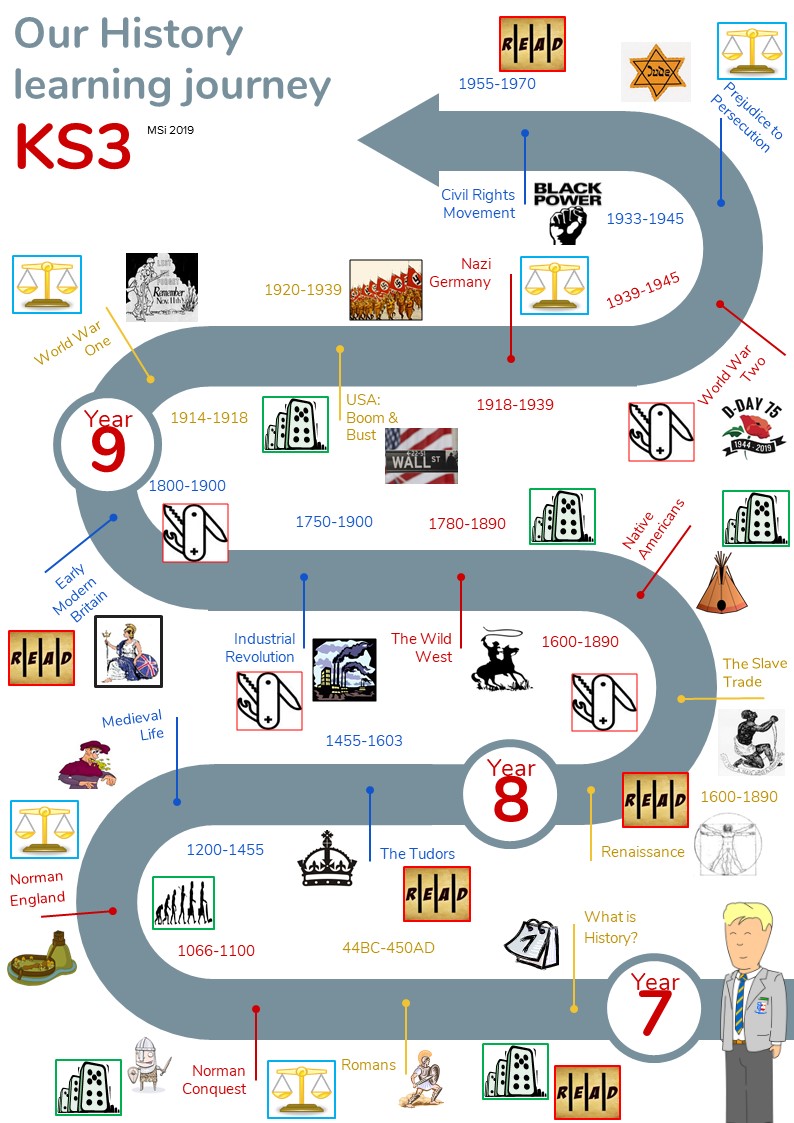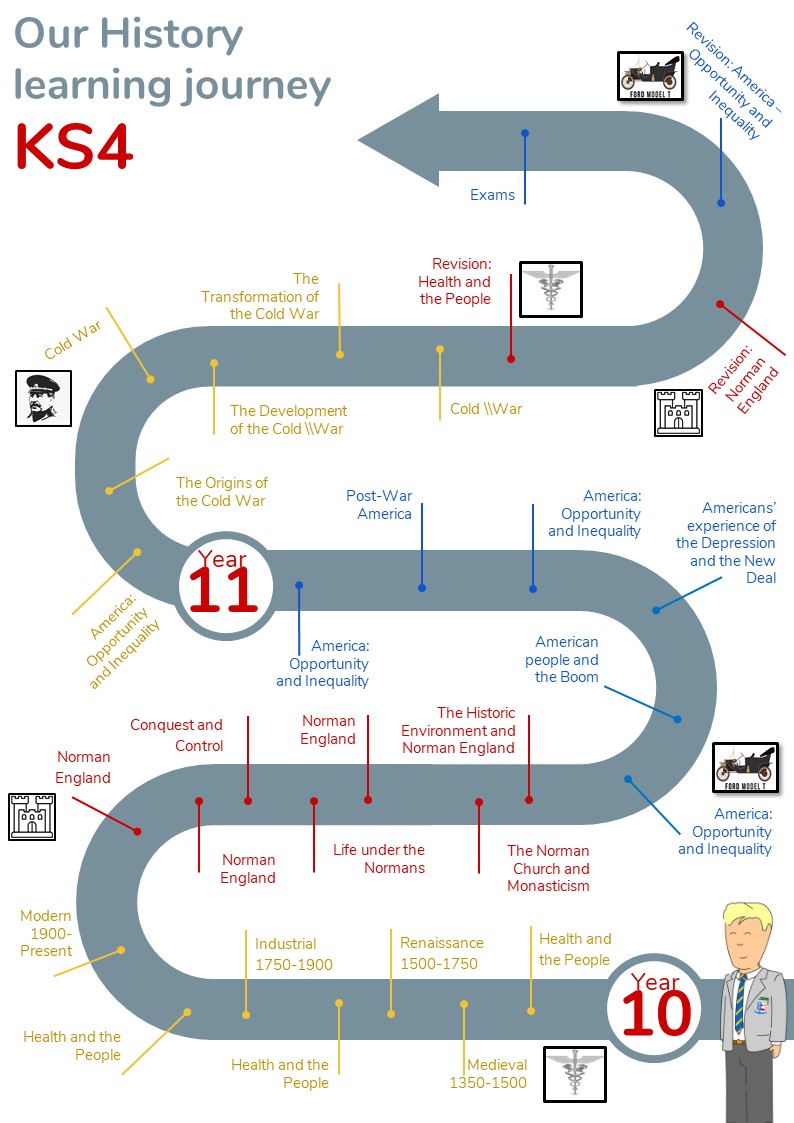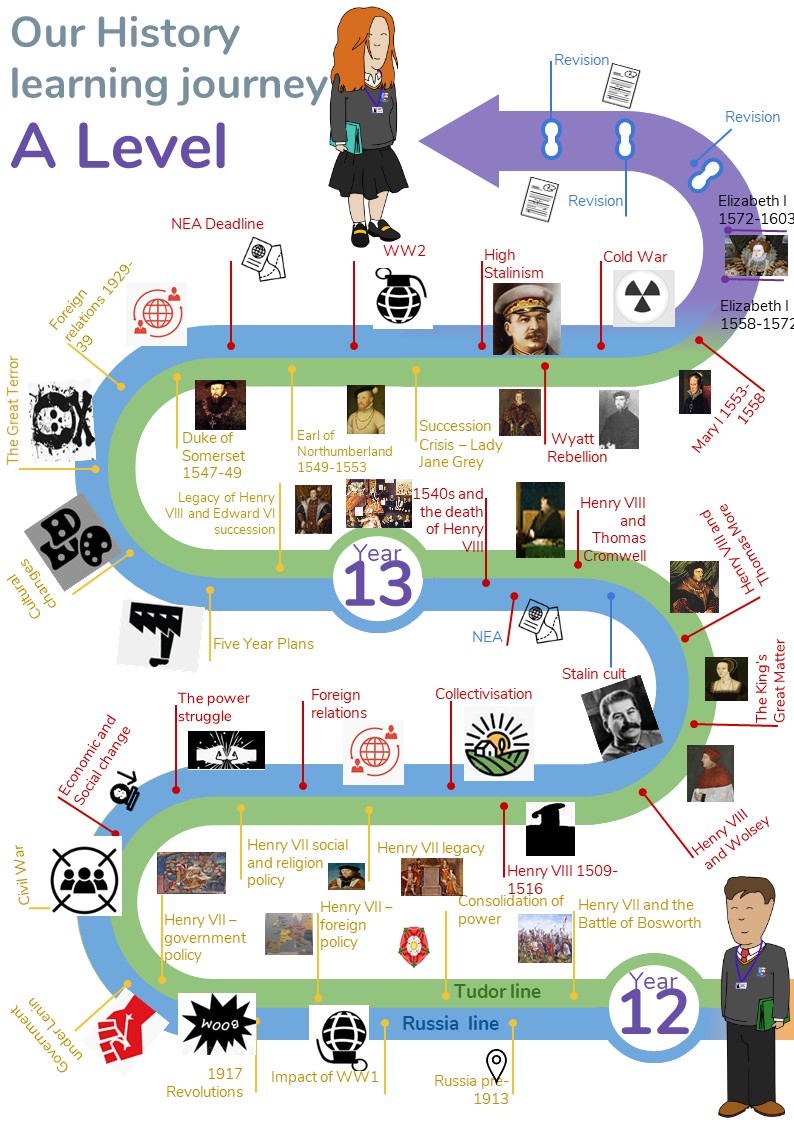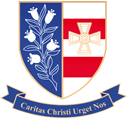Key Stage 3:
Our Key Stage 3 Curriculum in designed to develop Historical skills such as extended essay writing, supporting arguments with factual information and questioning historical sources. Such skills are transferrable to other subjects and are of great use at GCSE and beyond.
Students take part in activities which are equally challenging, yet fun and engaging. Students will study a wide range of topics, beginning with investigating the Norman, medieval, Tudor and Stuart periods in Year 7. This is followed by studying slavery, the industrial revolution and the First World War in Year 8. Finally moving towards the more challenging aspects of studying Nazi Germany and the Cold War in Year 9.

Key Stage 4:
The GCSE history course is designed to engage and enthral students with an eclectic mix of topics studied.
The GCSE course follows the AQA exam board specification. The specification ensures a substantial study of history as its structure embeds the requirement to study history across three eras, three time scales and three geographical contexts. Pupils will sit two papers entitled ‘Understanding the modern world’ and ‘Shaping the nation’. This is a linear course which means there is no coursework and both exams are sat at the end of year 11. Each paper has two sections and each section is worth 25% of the overall course of study.
Paper 1 – Understanding the Modern World
Pupils have two areas of study for this paper. We will firstly cover America 1920-1973. This period study focuses on the development of the USA during a turbulent half century of change. It was a period of opportunity and inequality – when some Americans lived the ‘American Dream’ whilst others grappled with the nightmare of poverty, discrimination and prejudice. Students will study the political, economic, social and cultural aspects of these two developments and the role ideas played in bringing about change. They will also look at the role of key individuals and groups in shaping change and the impact the developments had on them.
And Conflict and tension between East and West 1945-1972. It considers revolutionary movements during this time. It focuses on the causes and events of the Cold War and seeks to show how and why conflict occurred and why it proved difficult to resolve the tensions which arose during the Cold War. Pupils relish in their learning and understanding of these key events which shaped the 20th century and leads to a genuine awareness of how we have arrived at present day cultures and political scenarios.
Paper 2 – Shaping the Nation
Again, pupils have two areas to study for this paper. Firstly, Britain Health and the people c1000 to the present day and I think we would all agree that the role of medicine for our society has never been as important as it is at this moment in time. This thematic study will enable students to gain an understanding of how medicine and public health developed in Britain over a long period of time We will study key scientists, significant medicinal discoveries and explorations as well as tracing the impact of worldwide events upon our medicinal demands.
Secondly, Norman England 1066 – 1100. 1066 is widely recognised as the most important date in all of British history: the impact of the Norman invasion shaped our language, culture, religion and feudal system. In addition to our political, social and cultural viewpoints. A topic which has no counterpart in its significance for Britain.
If you have any questions or queries about GCSE History, please speak with your History teacher, Mrs Roddie.

Key Stage 5:
Why Study the Subject?
History is a fascinating subject. Every aspect of modern life has been influenced by what has come before and the two main topics of study at A Level highlight many of the key issues faced by governments and people in the past.
In the Russia element of the course there is the opportunity to investigate the creation of a dictatorship in the Soviet Union, by two of the most important people in modern history, Lenin and Stalin.
The Tudor section of the syllabus offers an exploration of the reigns and Henry VIII and Elizabeth I, along with several defining moments in British history such as the defeat of the Spanish Armada.
There is also a chance for each student to investigate a period of their own interest while completing the coursework module.
Course Content
Year 12 Russia 1917-1929:
The revolutions of 1917, Lenin, Stalin’s victory in the leadership struggle.
The Tudors 1485-1547:
The establishment of the Tudor dynasty by Henry VII, the reign of Henry VIII including the Reformation.
Year 13 Russia 1929-1953: (Exam worth 40%)
The dictatorship of Stalin, the USSR during WWII and its aftermath.
The Tudors 1547-1603: (Exam worth 40%)
The reign of boy king Edward VI. The part played by “Bloody” Mary in the mid-Tudor crisis. Elizabeth I – domestic and foreign developments.
Historical Investigation: (Coursework worth 20%)
Each year two students are selected to visit Poland as part of the Holocaust Educational Trust “Lessons from Auschwitz” programme. The students engage in seminars involving discussion with an actual survivor of the camp before participating in a guided tour of the Auschwitz site.
Upon their return they complete a project which can be used as credit towards a university degree. The History Department consistently achieves excellent results and offers an extensive support network for learning and progress.

Tudors Bridging Course Information


